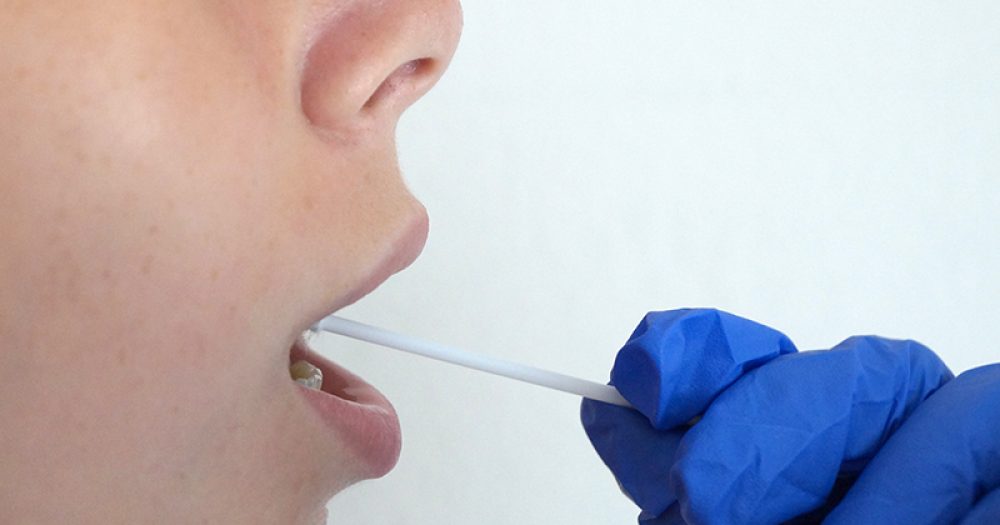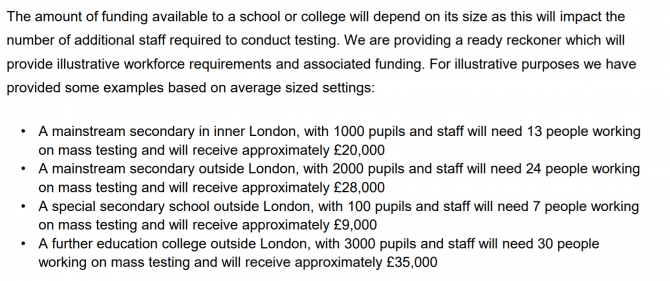A government official has admitted rapid tests due to be rolled out in schools next month can provide both false positives and negatives, amid growing concerns about the effectiveness of mass testing to keep more pupils in the classroom.
School leaders were also told in a webinar led by Department for Education officials today that £78 million will be made available to support schools roll the scheme out. The funding will be based on school size, with a 1,000-pupil and staff inner London secondary getting around £20,000.
The government’s mass testing plans have come under scrutiny recently after studies suggested the lateral flow tests – which provide results within 30 minutes – miss large numbers of positive cases.
‘Chance you can get a false positive and false negative’
But an NHS Test and Trace official told school leaders today the tests have “gone through a great deal of testing and rigorous evaluation”. However she admitted there are “chances you can get a false positive and false negative, [there’s] no denial”.
This means it’s important that social distancing is maintained, and people follow the hands, face, space advice as an “additional line of defence”, she added.
School leaders were also told the lateral flow tests have also been “proven” to work against the new strain.
A document shown during the webinar stated the tests “work”, highlighting validation studies conducted by Oxford University and Public Health England that show they were “as accurate in identifying a case as a PCR test” (which are processed in labs).
However, the guidance did state the tests have lower sensitivity and are better at picking up cases when a person has a higher viral load.
During mass testing in Liverpool, the lateral flow tests missed over half of cases. A study from testing among university students suggests even poorer performance.
Currently, pupils who are close contacts of positive cases isolate. However under the new plans, close contacts will be tested each day for seven days. If they are negative, they can stay in school for the day.
‘We’ll end up with more outbreaks in schools’
Professor Jon Deeks, a Biostatistician at the University of Birmingham, said the use of these tests in such circumstances was “madness” as they are “not working well” at detecting Covid in people without symptoms.
“We’ll end up with outbreaks in the school which would wouldn’t happen in our current policy of sending kids home,” he told the BBC.
As revealed by Schools Week on Monday, £78 million will be made available to reimburse schools and colleges for “reasonable support” costs. The Confederation of School Trusts (CST) said this works out at around £15 per student.
This will “primarily” cover workforce costs, school leaders were told. Another example of an eligible cost was paying for floor coverings in testing areas which have to be non-porous, meaning carpet must be covered over with a hard surface.
The government will publish a “workforce planning tool” that will determine how much funding schools will be eligible for.
An updated handbook on the plans states a mainstream secondary outside of London with 2,000 pupils would need 24 people working on mass testing, and would receive £28,000. Meanwhile a special school outside of London with 100 pupils and staff would need seven staff and get £9,000 (see below).
Independent schools will not eligible for the funding, but will receive tests and training packages.
All schools will get their testing kit and personal protective equipment on January 4th, leaders were told.
‘No plan’ to help schools recruit testing staff
Schools will also be responsible for recruiting their own staff to oversee the tests, with an official saying there was “no plan for a national workforce model where we allocate staff out”.
The government will also set out a legal agreement with terms and conditions relating to the tests, which schools will opt in to. Further information on waste disposal “will be provided shortly”.
School leaders were also told that the expectation “at the moment” is for a staggered return to on-site learning for non-exam students after Christmas.
Ministers are under pressure to review the situation after stricter restrictions following a rise in cases said to be caused by a new strain of Covid, with concerns it could spread more easily among children.
The Department for Education has said they want to “break the chains of transmission and help reduce the risk as far as possible” and “drastically cut down” the number of pupils isolating.
Secondary schools had an average of 24 pupils isolating per confirmed Covid case on December 10.
Meanwhile, updated guidance from Department for Education today advises that clinically extremely vulnerable (CEV) children should not go into school, while CEV staff should work from home if possible.
Those who live with someone CEV should still go into school.









Your thoughts